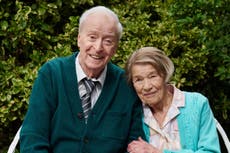It’s a privilege to watch acting greats like Michael Caine grow old on celluloid
In great British feelgood film ‘The Great Escaper’, audiences can see the final performance from Glenda Jackson, and one of the last from Michael Caine. It’s a reminder that there’s never been a better time to see our senior citizens on screen, writes Jasper Rees

There is a powerful significance to the opening shot of The Great Escaper. In this year’s British feelgood film – released in cinemas this weekend – a figure stands on a shingle beach looking out to sea. His mighty frame is silhouetted against the chilly gun-metal grey of the English Channel as he leans proudly, even defiantly, on a walking stick. This is the picture – it’s almost a still – of an old man contemplating the inevitable.
On one level, of course, Oliver Parker’s film tells of Bernard Jordan, a veteran who in 2014 made headlines by slipping away from his care home to France, to mark the 70th anniversary of the D-Day landings. He became a plucky national hero for that week’s news cycle. But even from behind, even with the unfamiliar stick, you know that the figure on the shore is Michael Caine. So on another subliminal level, the shot is telling you something else: that this is a valediction; this could be the last time we ever see perhaps Britain’s greatest-ever film star on the big screen.
Thanks to Covid, Caine hadn’t made a film for three years before The Great Escaper, and his physical needs as an 89-year-old had to be accommodated in order to get the shoot done. “I thought I was finished,” he has said. “And I suddenly did it – and had such a wonderful time. They gave me a very good walking stick, and I was able to do scenes that needed that. I’d just do them once and then fall over.”
His performance is a reminder that actors don’t retire. If they’re good at what they do, and enjoy a long career, it’s possible to watch them journey from bright-eyed youth through the portals of midlife and onwards into the last-chance saloon of extreme old age.
As it turns out, Caine recently revealed that he is to work again: he will retire after playing Charles Darwin in an unnamed forthcoming project. Instead, The Great Escaper is the final curtain for Glenda Jackson, who died in June at the age of 87. As Jordan’s wife Irene she gives a performance of great warmth and zip with striking cheerfulness, even as you worry her character could at any moment keel over. It is the last grace note in a career that once climbed mountains and then went dormant as she entered politics. When she returned after 20 years it was to play King Lear at 80, not once but twice, first in London, and then in another production in New York, and then to win a BAFTA and an Emmy for Elizabeth Is Missing, the BBC drama about an old woman suffering from dementia.
No such outro was vouchsafed for Michael Gambon, who died last month at 82 having not appeared on the stage in many years or the screen since before the pandemic. The death of such a colossus is a harbinger of what is to come. That generation of dames and sirs who began in the 1960s, many emanating from Laurence Olivier’s National Theatre and among the first to enjoy the everyday, intimate fame conferred by television, are all now in their 80s.
It feels like a bad voodoo to name them, so perhaps instead we should give thanks that the current crop of senior citizens rejoice in more energy and opportunity than any cohort to have gone before. Two years ago, at 82 and in an age-blind production, Ian McKellen became the oldest actor ever to play Hamlet, and then last year in Edinburgh played him again in a narrative ballet. This year Anne Reid returned to the stage at 87, as did Eileen Atkins at 89. Meanwhile in the West End, Patricia Hodge and Nigel Havers, both in their 70s, star in Private Lives, filling roles always previously performed by actors a good three decades younger. Oh, and Helen Mirren was on the Paris catwalk this week at 78.

There’s never been a better time to watch stars grow old. More than the charming if heavily fantasised story of Bernard Jordan, this is the bittersweet pleasure of The Great Escaper: to witness two great actors do what they can do, together, consummately, one final time. It’s even possible, although younger actors play their characters in 1944, for the mind’s eye to patch in memories of their fresh-faced yesteryear: a dashing Caine in Alfie, say, or a fiery Jackson in Women in Love.
“It could be just around the corner at 90,” says Caine. “Everyone’s going to join me eventually. No one’s going to say, ‘I’m so sorry you’re going to die – I wish you were like me and not going to die.’ Everybody’s going to die. At least I’ve lived to f***ing 90.”
The difference, of course, is the celluloid afterlife, the films he leaves behind. As they do in the film’s final image, Michael Caine and Glenda Jackson will hold back the tide for as long as there’s anyone to watch them and all the other ageless thespogenarians who have played out their entire lives in front of an audience.
‘The Great Escaper’ is in cinemas
Join our commenting forum
Join thought-provoking conversations, follow other Independent readers and see their replies
Comments


Bookmark popover
Removed from bookmarks